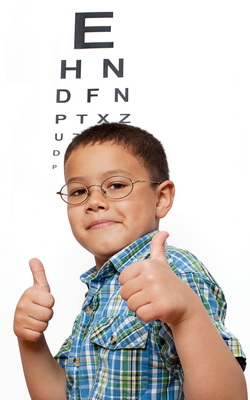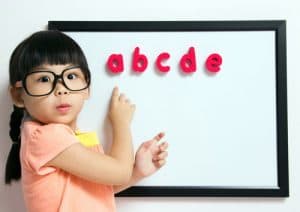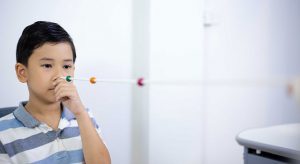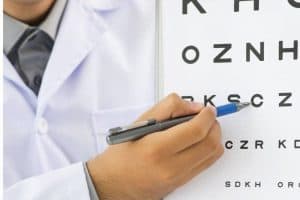If my child has passed a vision screening, does that mean they have ‘perfect sight’?
Unfortunately, no.
It’s a common misconception that vision screenings at school are the same as the regular eye comprehensive eye exams your child receives with their eye doctor.
Vision screenings are not a replacement for comprehensive eye exams, which should be done on a regular basis to ensure your child has the visual skills they need for learning.
Here are our top 4 most frequently asked questions about school vision screenings and comprehensive eye exams.
Q1: Are vision screenings and comprehensive eye exams the same thing?
No.
School vision screenings are much less thorough than comprehensive eye exams performed at your local school or health clinic.
School vision screenings assess whether a child is myopic (nearsighted) and may detect an obvious eye turn or lazy eye. Most screenings often lack the equipment to carry out anything but the most basic eye tests.
Comprehensive eye exams, on the other hand, are performed in a dedicated testing space, by trained eye care professionals, using up-to-date testing equipment and procedures.
School vision screenings are only able to catch the most obvious eye conditions, and will not be able to diagnose harder-to-detect conditions involving eye health or essential visual skills.
Your eye doctor is equipped and trained to detect all of these issues during a comprehensive eye exam.
Q2: What conditions can a routine school vision screening detect?
Routine school vision screenings can detect severe myopia and amblyopia, and tell if your child has vision that is less than 20/20.
However, vision screenings are not equipped to diagnose underlying conditions that may be causing these and other vision problems.
Visual skills essential for success in school, including eye teaming, tracking and accommodation cannot be evaluated.
Conditions such as pediatric glaucoma and other childhood eye diseases may remain undetected. For complex eye conditions, a comprehensive eye exam is necessary.
SEE RELATED: Healthy Eyes for Life: 10 Facts for School Children
Even if your child has had a vision screening, schedule a comprehensive eye exam with an eye doctor near you.
Q3: What’s wrong with relying on school vision screenings for my child’s eye and vision health?
There are a number of issues with school vision screenings that make them unreliable. These issues include:
- The testing environment and equipment may not guarantee accurate results:
Vision screenings usually take place in classrooms or school nurse offices. These rooms often do not have good lighting for testing.
Because the equipment is only used periodically, it often has not been maintained properly, and testing may be done either too close or too far away from the testing chart.
All of these factors can severely harm the accuracy of results.
- Those performing the tests may not be adequately trained:
For all their good intentions, the people doing these screenings are not trained eye care professionals, whose job it is to maintain your child’s eye health.
Volunteers from the community and personnel from the school, such as teachers, often fill these roles. They may not have the expertise to properly conduct the tests, or interpret the results accurately.
- Testing is limited to 20/20 vision and only the easiest and most obvious vision issues:
These tests rely almost solely on the Snellen vision chart, which was invented 150 years ago, and only assesses a person’s distance vision.
Assessments based on the vision chart do not test for the near vision acuity that a child needs for reading or writing in school.
Focusing, eye tracking, eye teaming, and other visual skills that are essential for many school activities also cannot be assessed with a Snellen chart. Nor can a child’s overall ocular health.
Q4: Does my child need a comprehensive eye exam if they passed their school vision screening?
Yes.
The National Parent Teacher Association (NPTA) reports that as many as 10 million children in the United States suffer from vision problems that can impact their ability to learn in school.
Because school vision screenings are so limited, they may miss the vast majority of these conditions.
Even if your child does well on their school vision screening, it’s essential to bring them to your local eye care clinic for a comprehensive eye exam on a regular basis.
Only a thorough exam can assess most vision problems, as well as a child’s eye health and visual skills.
Eye care professionals recommend that children begin having comprehensive eye exams as early as 6 months old. This ensures early detection and treatment of vision issues that might otherwise cause problems with learning when they start school.
Once your child is of school age, they should have exams once a year.
LEARN MORE: Vision for School
If you have any concerns about your child’s vision or academic performance, schedule an eye exam with an eye doctor near you.
Vision screenings are not a replacement for comprehensive eye exams.
Eye exams with an eye doctor should be done on a regular basis to ensure your child has the clear vision and visual skills they need for learning.









